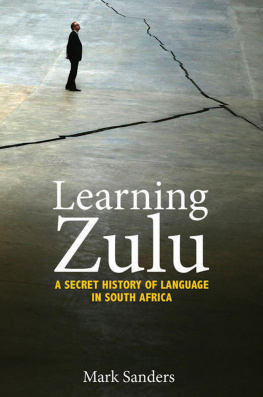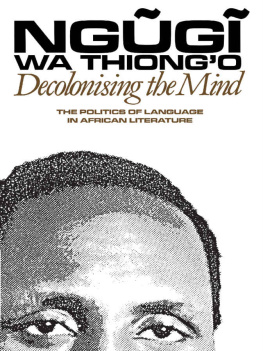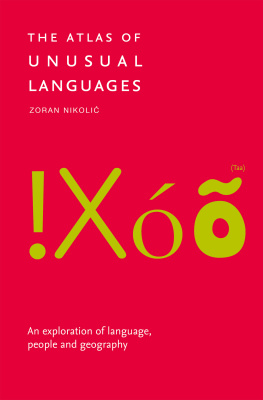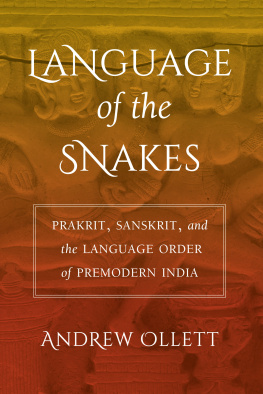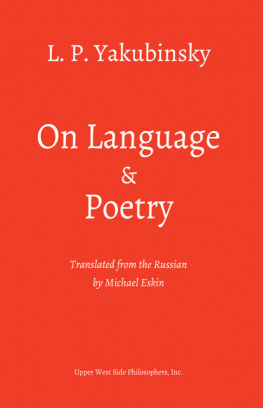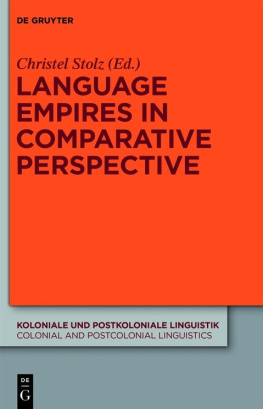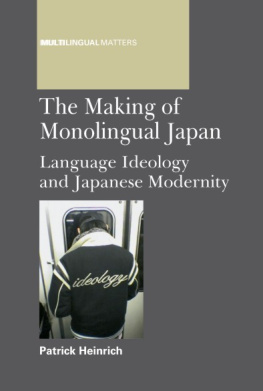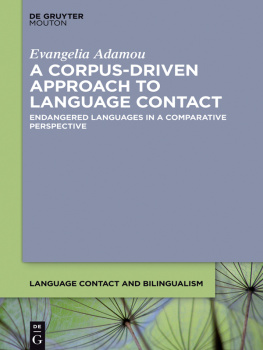T HE T ONGUE -T IED I MAGINATION

Fordham University Press gratefully acknowledges financial assistance and support provided for the publication of this book by the University of California, Davis.
This book was a recipient of the American Comparative Literature Associations Helen Tartar First Book Subvention Award. Fordham University Press is grateful for the funding from this prize that helped facilitate publication.
Copyright 2019 Fordham University Press
All rights reserved. No part of this publication may be reproduced, stored in a retrieval system, or transmitted in any form or by any meanselectronic, mechanical, photocopy, recording, or any otherexcept for brief quotations in printed reviews, without the prior permission of the publisher.
Fordham University Press has no responsibility for the persistence or accuracy of URLs for external or third-party Internet websites referred to in this publication and does not guarantee that any content on such websites is, or will remain, accurate or appropriate.
Fordham University Press also publishes its books in a variety of electronic formats. Some content that appears in print may not be available in electronic books.
Visit us online at www.fordhampress.com.
Library of Congress Cataloging-in-Publication Data
Names: Warner, Tobias, author.
Title: The tongue-tied imagination : decolonizing literary modernity in Senegal / Tobias Warner.
Description: First edition. | New York : Fordham University Press, 2019. | Includes bibliographical references and index.
Identifiers: LCCN 2018059018| ISBN 9780823284634 (cloth : alk. paper) | ISBN 9780823284290 (pbk. : alk. paper)
Subjects: LCSH: Senegalese literature (French)20th centuryHistory and criticism. | Senegalese literature (French)21st centuryHistory and criticism. | Senegalese literature20th centuryHistory and criticism. | Senegalese literature21st centuryHistory and criticism. | SenegalLanguagesPolitical aspects. | Postcolonialism in literature.
Classification: LCC PQ3988.5.S38 W37 2019 | DDC 809.99663dc23
LC record available at https://lccn.loc.gov/2018059018
Printed in the United States of America
21201954321
First edition
for Lauren
CONTENTS
I have opted for the modern transcription system for Wolof established by Arame Fal. For the sake of clarity, I follow the conventional spellings of authors names that already exist in English and French rather than those used in Wolof (e.g., Diop instead of Job, Ndao instead of Ndaw). For passages in Wolof given in older transcription systems, I have chosen to include both the original and a transliteration into Fals system.
Unless noted below, the letters used in Wolof passages correspond phonetically with their equivalents in English.
Vowels
as in cat
aas in cut
eas in met
as in fianc
as in third
ias in sit
oas in mop
as in load
uas in moo
A double vowel (uu) means the vowel is long.
Consonants
cch as in chess
as in onion, similar to Spanish
qstrong k sound similar to Arabic qf ()
xstrong kh sound similar to Arabic kh ()
ng or nasal ng sound, as in parking
A double consonant (dd) means the consonant is long.
Adapted from Arame Fal, Phonetic Correspondences Between Wolof and English.
There was an uproar at the first conference devoted to African literature of French expression. Among the crowd of writers, academics, publishers, and students who were gathered in the Senegalese capital of Dakar in March 1963 to celebrate African literature written in French, the Senegalese novelist and filmmaker Ousmane Sembne attacked the very premise of the event. Sembne demanded to know why the conference was devoted only to writers working in French. Why was literature written in a former colonial language being institutionalized in a nation that was supposed to be undergoing decolonization? Sembne spoke at length and warned that unless African languages became languages of literary expression, our literature will still be subject to the control of other powers, or other peoples good intentions. But he was swiftly challenged by one of his compatriots, Birago Diop, who invited Sembne to repeat his critique in Wolof, the most widely spoken language in Senegal. I would like to ask M. Sembne Ousmane to repeat the whole of his speech in Wolof, Diop requested wryly. That is all. Because he talks about cultural imperialism. Let him make the same speech, as eloquently, in Wolof. Sembne, a Wolof speaker as well, admitted that he could repeat some of what he had said, but not all, for want of terminology, but he insisted that this did not make the Wolof language poorer. Amid a mounting chorus of interruptions and objections from other conference-goers, Sembne attempted to turn Diops question around by shifting the focus from expression to audience. Sembne proclaimed that he could have written his first novel in Wolof rather than in French, but then, he wondered, who would have read it and how many people would the book have reached? As he pondered this state of affairs, Sembne observed somewhat ruefully, This is one of the contradictions of our life.
But could you say it in Wolof? And what audience would you reach if you did? This exchange captures a thorny problem that would come to be known as the language question: should one write in a former colonial language or in a vernacular? As the wave of decolonizations crested at midcentury, similar questions and contradictions bedeviled writers and scholars across the globe as they sought to build, categorize, and compare literary traditions in the wake of European colonialism. From India, Kenya, and Angola to Martinique, South Africa, and Morocco, writers in the second half of the twentieth century reflected on the language of creative expression in a decolonizing world.
There has always been something untimely about the language question. Like Sembnes intervention in Dakar, debates over the language of postcolonial literatures have often taken the form of an interruption. This was especially the case in the field of African literature, where language debates erupted in the 1960s almost simultaneously around the legitimacy of francophone and anglophone African writing. A year before Sembnes outburst at the Dakar conference, the language question materialized in the aftermath of a similar gathering of African Writers of English Expression at Makerere University in Kampala, Uganda. The June 1962 Makerere conference drew together future literary icons, including Chinua Achebe, Wole Soyinka, Gabriel Okara, and a young Ngg wa Thiongo, who met to discuss the current state and future trajectory of anglophone African literature. The conference is perhaps best remembered for unleashing one of postcolonial literatures most recognizable polemics.
What is African literature? the Nigerian poet Christopher Okigbo asked at the very first session at Makerere.
More than fifty years after the Dakar and Makerere conferences, the language debates have come to feel untimely in a different way. There is now a palpable sense for many writers and critics that the issue of language is a holdover from the past. The contemporary Nigerian writer Helon Habila captured this sentiment in a post for the Caine Prize for African Writing in 2014, in which he marvels that it feels strange to remember that there was a time, and not too long ago, when some theorists tried to limit what can or cannot be called African literature; some said a work can never be African literature unless it is in an African language. Habila situates the language debates in an in-between temporalitydistant from our own literary present and yet not so very long ago.
Next page

